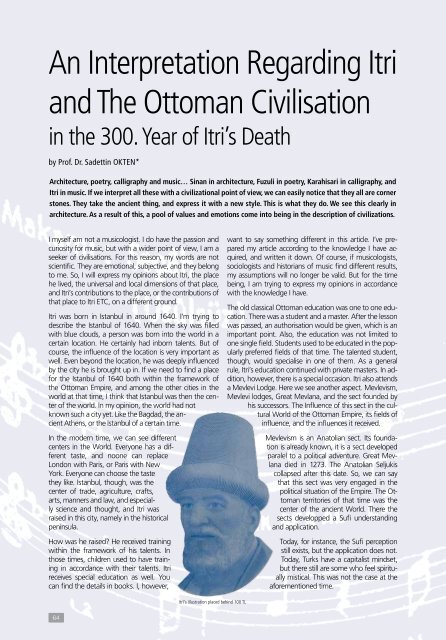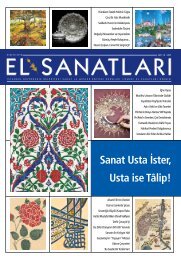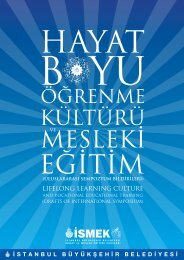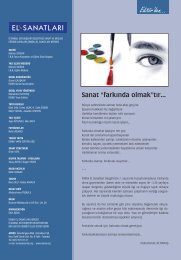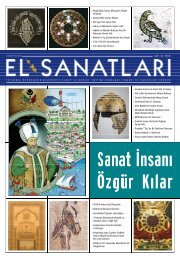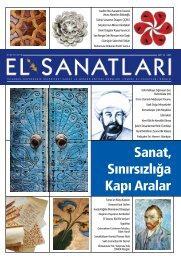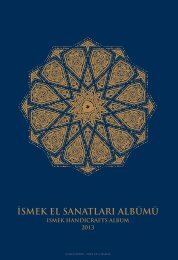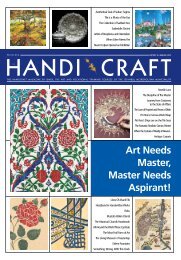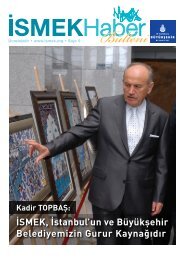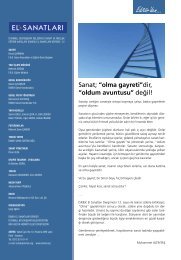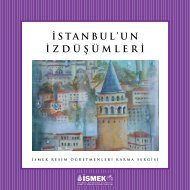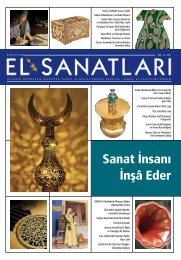An Interpretation Regarding Itriand The Ottoman Civilisationin the 300. Year of Itri’s Deathby Prof. Dr. Sadettin OKTEN*Architecture, poetry, calligraphy and music… Sinan in architecture, Fuzuli in poetry, Karahisari in calligraphy, andItri in music. If we interpret all these with a civilizational point of view, we can easily notice that they all are cornerstones. They take the ancient thing, and express it with a new style. This is what they do. We see this clearly inarchitecture. As a result of this, a pool of values and emotions come into being in the description of civilizations.I myself am not a musicologist. I do have the passion andcuriosity for music, but with a wider point of view, I am aseeker of civilisations. For this reason, my words are notscientific. They are emotional, subjective, and they belongto me. So, I will express my opinions about Itri, the placehe lived, the universal and local dimensions of that place,and Itri’s contributions to the place, or the contributions ofthat place to Itri ETC, on a different ground.Itri was born in Istanbul in around 1640. I’m trying todescribe the Istanbul of 1640. When the sky was filledwith blue clouds, a person was born into the world in acertain location. He certainly had inborn talents. But ofcourse, the influence of the location is very important aswell. Even beyond the location, he was deeply influencedby the city he is brought up in. If we need to find a placefor the Istanbul of 1640 both within the framework ofthe Ottoman Empire, and among the other cities in theworld at that time, I think that Istanbul was then the centerof the world. In my opinion, the world had notknown such a city yet. Like the Bagdad, the ancientAthens, or the Istanbul of a certain time.In the modern time, we can see differentcenters in the World. Everyone has a differenttaste, and noone can replaceLondon with Paris, or Paris with NewYork. Everyone can choose the tastethey like. Istanbul, though, was thecenter of trade, agriculture, crafts,arts, manners and law, and especiallyscience and thought, and Itri wasraised in this city, namely in the historicalpeninsula.How was he raised? He received trainingwithin the framework of his talents. Inthose times, children used to have trainingin accordance with their talents. Itrireceives special education as well. Youcan find the details in books. I, however,want to say something different in this article. I’ve preparedmy article according to the knowledge I have acquired,and written it down. Of course, if musicologists,sociologists and historians of music find different results,my assumptions will no longer be valid. But for the timebeing, I am trying to express my opinions in accordancewith the knowledge I have.The old classical Ottoman education was one to one education.There was a student and a master. After the lessonwas passed, an authorisation would be given, which is animportant point. Also, the education was not limited toone single field. Students used to be educated in the popularlypreferred fields of that time. The talented student,though, would specialise in one of them. As a generalrule, Itri’s education continued with private masters. In addition,however, there is a special occasion. Itri also attendsa Mevlevi Lodge. Here we see another aspect. Mevlevism,Mevlevi lodges, Great Mevlana, and the sect founded byhis successors. The Influence of this sect in the culturalWorld of the Ottoman Empire, its fields ofinfluence, and the influences it received.Mevlevism is an Anatolian sect. Its foundationis already known, it is a sect developedparalel to a political adventure. Great Mevlanadied in 1273. The Anatolian Seljukiscollapsed after this date. So, we can saythat this sect was very engaged in thepolitical situation of the Empire. The Ottomanterritories of that time was thecenter of the ancient World. There thesects developped a Sufi understandingand application.Today, for instance, the Sufi perceptionstill exists, but the application does not.Today, Turks have a capitalist mindset,but there still are some who feel spirituallymistical. This was not the case at theaforementioned time.Itrî's illustration placed behind 100 TL64
One of the founders of the civilisational interpretation ofthe Ottoman Empire is this Sufi perception. So, we cansay that, within a civilisational point of view, Itri was alsoinfluenced by this perception since he received his educationfrom a Mevlevi Lodge. If we think about Istanbul withinthe conjuncture of the World at that time, and if we takeinto consideration the status of Mevlevi Lodges within thecultural World of the Ottoman Empire, we see more differentviews than what we see today. Both Istanbul, andthe Mevlevi Lodge are important factors that influenced Itri.Because they are actors that regulate life, form the basis forcivilisation, and have their say in the application. The thirdphase within a civilisational point of view is the support andencouragement given to Itri by the Ottoman Palace. Thepalace is a political institution, but also a cultural one. In ourcourse curriculums, the Palace is always reflected as a politicalinstitution only. Recently, we have also begun to associateit with the intriques played in it. The palace, though, isa serious cultural institution. The Ottoman Empire was a hierarchicalsociety. So, everyone looked up to the palace. Pashas,Beys, and the people took the Palace as an example.The Palace is an institution which was open to the society,and it also educated people.Mehmet the 4th, who we also know as the Hunter Mehmet,patronaged Itri. Itri spent a long time in the Palace foreducational duties, but the Palace encouraged and honoredhim greatly. It was only due to this encouragementand support that the works of art which belonged to himcame into being.Mehmet the 4th was removed from the throne after theunsuccessful 2nd Vienna Besiege, and dies after a while. Hewas then succeeded by Selim Giray Han, the Han of Krimia.I do not know whether Itri left Istanbul after that, but whatwe know is the fact that he was patronaged by this Han.Here we see that there was a serious political conflict betweenthe Ottoman Empire and Krimia during the 2nd ViennaBesiege. Our history books write that it is due to thisconflict that we were defeated in Vienna. But this conflictdid not cause a genious musician like Itri to be neglected.The reason for this is the concept of “civilisational families”in the perception of civilisations. So, although there werepolitical, financial or boarder conflicts, this did not requirethe most important values of civilisation to be ignored,denied, or declined. They thus embraced each other. Thatis why Selim Giray Han the 1st patronaged Itri as soon asMehmet the 4th died. This behaviour raises an importantmatter. The description of a civilization should not be loadedon the shoulders of a single society. The description of acivilisation can develop only if it is carried on the shoulder ofa civilisation family which is the member of different societies.It is thus a heavy load for a single society.Nevakâr is another example for this case. They discuss if itbelongs to Itri or not. It was written by Hafiz-i Sirazi. Actually,there are poets who wrote very beautifully at that time.Fuzulî, for instance. So, a beautiful ghazal from Fuzulî couldhave been opted for as well. So, this also shows that thedescription of civilisation comes into being as the productof different families and different societies.Maybe, the great flaws which occured during the last periodof the Ottoman Empire occured due to the fact thatthe modern interpretation of the Islamic Civilisation descriptionwas loaded on the back of the Ottoman Empire only.When we look at the 17th century, we see that the OttomanEmpire was at the center of the old World. It had dominatedimportant trading roots, and fertile agricultural fieldswere in its territories which it managed in a secure and fairway. This situation was called “the Ottoman Peace” or “PaxOttomana”. This situation had a drastic change, though, atthe end of the 1600s and the beginning of the 1700s. Thestates that were neighbours to oceans explored the oceans.They were then stayed at the perifery since the OttomanEmpire was the center. New trading roots began to be usedwithin a century, and this disturbed the Ottoman Empirewith small movements. Also, a new technology, anotherview of nature, and signs of an industry revolution began tobe adopted. In the meantime, the Ottoman Empire whichgrew, became widespread and felt more relaxed had atough defeat in Vienna.However, if we look at life in 1600s, and especially thesecond half of the 1700s, we see that a single type of humancame to the scene, which is an important issue sincea civilisation can live only with its sui generis type of humans.Also, we see that a version of the same languagehad emerged. Some considered the Ottoman language asa new language, and some as another version of Turkish.Thirdly, we see that a set of manners and law had beenformed. A Sufi life and a common platform of thoughtshad emerged. These alla re the sine qua non subelementsof a civilisation.Architecture, poetry, calligraphy and music… Sinan in architecture,Fuzuli in poetry, Karahisari in calligraphy, and Itriin music. If we interpret all these with a civilizational pointof view, we can easily notice that they all are corner stones.They take the ancient thing, and express it with a new style.This is what they do. We see this clearly in architecture. Asa result of this, a pool of values and emotions come intobeing in the description of civilizations. The Sultan in theTopkapi Palace and the Castellan on the top of the castlethink in the same way. The commonality of thoughts andactions although the communication facilities of that timewere very limited show that the description of civilisationsstill remains and continues to keep a society lively.The following is the contribution of the Itri style music to theexistence of the description of civilisations: The descriptionof civilisations spread through values and the reflection ofthese values in life. Namely, with a poem, an architecturalwork or calligraphy. The difference of music, though, is thefact that it can be transferred very easily although it is veryabstract. It can be transferred from ear to ear, from tongueto tongue, and from heart to heart. It thus provides a commonalityof emotions not only among different individualsin a country, but also among different societies as well.In my opinion, Itri is still great and monumental even if hecomposed 2 works only, and his contribution to the descriptionof civilisations is unique.Member of the Board of Trustees in the Fatih Sultan Mehmed Waqf University65
- Page 1:
Art Leads Oneto Eternity!
- Page 4 and 5:
In ThisEdition1506The StringentMast
- Page 6:
Dear Istanbulians,After the industr
- Page 10 and 11:
One Marbler Has Carried This Colorf
- Page 12 and 13:
this art”. Being single those day
- Page 14 and 15:
in flower marbling.” He says, and
- Page 16 and 17: Cicek Derman: The DoyenneFlower of
- Page 18 and 19: and does not want her to either stu
- Page 20 and 21: der the very inside of you.” She
- Page 22 and 23: ate” at all. The creator is one,
- Page 25 and 26: Kundekâri:The Time Defying Heritag
- Page 27: Cracks and incisions which could oc
- Page 30 and 31: land to understand weather he can p
- Page 32 and 33: When Deep WavesWash Ashore!by A. Ul
- Page 34 and 35: 'Bismillah' by Omer Faruk Deretaste
- Page 36 and 37: 'The Asr Surah' by Mustafa Cemil Ef
- Page 38 and 39: Van Gogh,The Genious Painter of Yel
- Page 40 and 41: and anxieties that surrounded him s
- Page 42 and 43: The most prominent features which w
- Page 44 and 45: Starry Night Over the Rhonehe opted
- Page 46 and 47: the left side of his face is a colo
- Page 48 and 49: The Threaded Version of Silver isRe
- Page 50 and 51: out from a narrower hole. Theseoper
- Page 52 and 53: Sumi-e: The Elegance which Comesint
- Page 54 and 55: traditions, perform this art seated
- Page 56 and 57: sumed in half an hour after it is p
- Page 59 and 60: er in ISMEK, after her illumination
- Page 61 and 62: 59Illustration: Hatice Ozturk
- Page 63 and 64: there was a captures chamberlain. 5
- Page 65: lack sides. As far as I can see del
- Page 69 and 70: The miniature by Ochiai Yoshiiku da
- Page 71 and 72: Miniatures are in the Irony of West
- Page 73 and 74: pictions of various countries, coul
- Page 75 and 76: A miniature example from the work n
- Page 77 and 78: “Ve mâ rameyte iz rameyte ve lak
- Page 79 and 80: usually there is a part consisting
- Page 81 and 82: When applied on wood, Edirnekâri c
- Page 83 and 84: What is very distinct regardingthe
- Page 85 and 86: The ceiling decorations, corner cab
- Page 87 and 88: There is an epigram for the Artof C
- Page 89 and 90: If the paper had spoken and told wh
- Page 91 and 92: nailing, gluing or compressing of t
- Page 93 and 94: gold. The notebooks with gold leave
- Page 95 and 96: laminary and get the required thick
- Page 97 and 98: Both the insufficience of green fie
- Page 100 and 101: 15 years ago, Mr. Yesilce allocated
- Page 102 and 103: On the Zoomorphic1Originsof the Rum
- Page 104 and 105: Shape-6Shape-13another finding foun
- Page 106 and 107: The Harem in the Topkapi Palace,The
- Page 108 and 109: very much like the school of boys i
- Page 110 and 111: The Blue Doors of TunisiaThe Articl
- Page 112 and 113: Tunisia is the pearl of the Mediter
- Page 114 and 115: Ottoman CultureProducts from Qadi R
- Page 116 and 117:
An Overview of Written Sourcesin Ot
- Page 118 and 119:
Signature of Abdulhamit II on the c
- Page 120 and 121:
Pieces of Wastepapers TurnInto Jewe
- Page 122 and 123:
in a short time, we ask him to make
- Page 124 and 125:
Symbols of theLife of Thoughtby Pro
- Page 126 and 127:
The Gulpayegan Masjid Kufi writing
- Page 128 and 129:
which show some of the monumental w
- Page 130 and 131:
An appearance from the interior of
- Page 132 and 133:
The Kufic script at the top is prep
- Page 134 and 135:
in yerinize grafologla konusuverir.
- Page 136 and 137:
considered as a hard science rather
- Page 138 and 139:
Zeynep Bornovali states that differ
- Page 140 and 141:
The Dance of the Needle with Cerami
- Page 142 and 143:
was not the case, however, for the
- Page 144 and 145:
an area determined on the material
- Page 146 and 147:
Dilek Hanif: A Fashion DesignerWho
- Page 148 and 149:
others prefer to have a single and
- Page 150 and 151:
Princess Nazli:The Patron of Arts a
- Page 152 and 153:
which was also known as “Villa He
- Page 154 and 155:
A Bouquet From the Hidden Paradiseb
- Page 156 and 157:
Canfeza (Heart touching) A fully st
- Page 158 and 159:
“Someone whom I hadn’t met befo
- Page 160 and 161:
The Storm of ISMEK Blowingin the In
- Page 162:
Menaf Nam's work which was awarded


